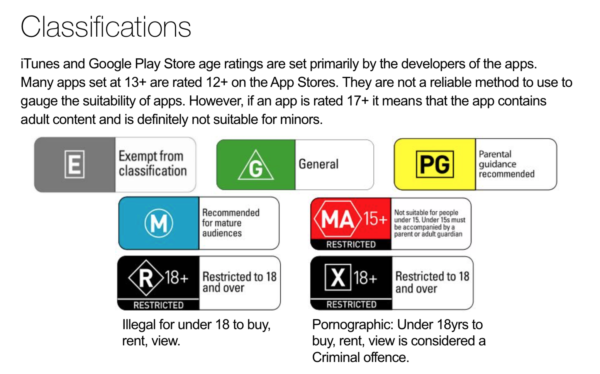The last few weeks as I’ve been holding Cyber Safety Seminars around some Sydney Schools, I’ve been hearing some alarming news from teachers. The increase in the uptake of adult social media apps and the subsequent behaviour on those apps has been an increasing problem. Some teachers believe that around 70% of stage 2 students (year 3-4) in some schools are on some sort of social media, and they estimate that about 90% of students in Stage 3 (years 5-6) are on apps like TikTok, Snapchat or Instagram. Some teachers have told me that they are also hearing about some primary school students playing adult R18+ video games and watching MA15+ Movies.
Social Media Strategies For Grades 3 and 4
When I hold talks with primary school students, I tend to focus on online gaming for the junior students Roblox – Minecraft and Fortnite and staying safe on those platforms with a section involving of social media education. I focus quite a bit more on social media safety with the years 5-6 students as the majority are already (although underage) signed up for Instagram and Snapchat by then. I talk with them about dealing with behaviour online, and we trouble shoot about how to deal with upsetting scenarios, about disrespectful behaviour, getting help and about only friending real connections. I also stress that being on apps rated 13+ when you are under that age, is actually against the legal terms of service of the platform, and that this means that you have no legal recourse should something go wrong, that you are breaking the rules. But I know that even saying that, without the support of parents, it can all sound so hollow and may only make a very small difference.
Why Are Parents Giving In?
Parents in the majority are now either openly allowing their children on social media underage or turning a blind eye. Or perhaps totally unaware, yes kids can be incredibly sneaky. Some parents have openly told me in my seminars, that they just can’t take their children off social media, even though underage, as that would ostracise them from their peers, and as a parent myself I really do understand that. Having your child being the only one NOT on social media can seem like they are being socially locked out. Which is why parents who truely do support keeping children away from adult apps until they are mature enough to handle them need to take a stand as a community. If enough parents do support delaying access to social media, NOT being on social media in primary school would be the majority not the other way around. Helping parents to be cyber safety educated enough to understand the importance of this is also very difficult when parents think they have the situation handled and don’t need any more education.
I’m sure if parents as a majority were aware of how important it is to their child’s development and safety to delay exposure to the adult world that is on social media they would take a stand. But I don’t think most parents have a clue what sort of content and behaviour is available on these apps and what their child can be actually exposed to. Navigating the adult content, the nasty comments, adult predators and more is a huge responsibility for a young child. There is also the social implications on social media of always having to have lots of likes and friends and keeping up an admirable life online, can also take a huge toll.
What Is The Harm On Social Media Anyway? Isn’t Snapchat Just Fun Filters And Messaging?
A teacher told me at a recent visit to a primary school she knows of a Kindergarten child on Snapchat…which is full of adult content – just swipe to the left to the “discover” panel and scroll down…one of the first articles I see today is…”Why he can’t get it up after he’s been drinking” try explaining that to a 7 year old. Parents are often astonished when I ask them to swipe left on Snapchat, it’s a tab they have never even seen or bothered to explore. Most parents do not ever see explicit content on social media during their daily use, but don’t understand that children use social media very differently to adults, they explore. So just like we may have looked up rude words in the home dictionary, children when they hear a “naughty” word might look that up on Instagram…try it yourself, in private… and make sure you delete your history. Adults post adult content on these apps, and there is no filter to block it out!
Confusing Messages
If parents are allowing children on apps where the age rating is clearly stated as 13+ and the students are also hearing from visiting Cyber Safety educators and their teachers that they must be 13+ to be on these apps, it must be very confusing for them when their parents or carers are saying it doesn’t matter, and that they can break this rule. I have had students approach me after presentations asking me why their parents are allowing them on apps that are rated older than them. They are confused! When it comes to other age limits later – drinking alcohol or driving a car…are those age limits also flexible?
Adults Modelling Respectful Behaviour Online
The other thing that must be confusing for children on social media apps, is seeing the behaviour of adults on these apps. When they are constantly being educated about good behaviour online, and being respectful, to see adults behaving badly and disrespectfully must be quite confusing. Adults who are sharing videos showing disrespectful content, adults who openly slam others online rather than work it out privately and respectfully, or bully others online. How are children supposed to believe anything that educators and parents say about good positive online behaviour when they are already exposed to all of this in primary school.
Staying out of online drama is one thing I stress in my talks with students of all ages, not taking out your anger online, but trying to work out your relationship issues privately or with an adult as a mediator. But it is so hard to convince children that this matters when adults are not modelling the behaviour we want from our children. It is no wonder that there is such a huge problem with online bullying and disrespectful behaviour. “If you are upset with someone, the worst thing you can do is take it online!” Is one of my key messages.
Let Kids BE Kids!
Exposing our children to this online social world too soon is having serious consequences. It seems like an impossible challenge to turn the tide on early use. And yet we have to do this in so many aspects of our children lives. The line between child and tween and teen is really getting blurred, and I and other educators are concerned it is adding to the stress and anxiety in our children lives.
The age ratings are clear and have been designed to help parents find suitable content for their children so that they can experience all the wonders of digital technology and media as children should.
www.commonsensemedia.org has reviews for Movies/books/games/apps.
You can set some parental controls to restrict your child’s access to adult content, but always supervise your child online regardless. Social media apps have no adult content filters and are full of explicit adult content if you care to search for some, it is easily found. Some parental controls to block access to adult apps and content can be circumnavigated by a child, they are only a safety net.
My manual has more in-depth information on adult content restrictions



